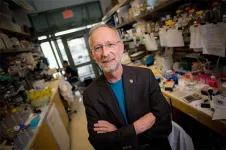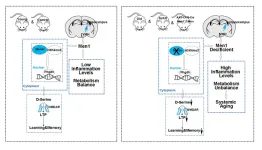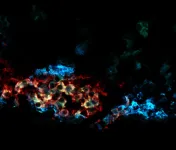(Press-News.org) Lush plants, large trees and many different, beautiful and colorful exotic animals. This is probably how most people imagine the small island of Mauritius in the Indian Ocean.
But that may not be the case. As in several other places in the world, the island and its nature are at risk of mass extinction, and in just a decade or two the flourishing nature and the many diverse animals may have dwindled to very few.
At least if the extinction of the many plants and animals on the island continues. They are part of a particularly sensitive ecosystem where animals help plants spread their seeds. However, if the animals disappear or are replaced by completely new species, the seeds will not spread in the same way as before. And that's a big problem, according to a new study from the University of Copenhagen.
"Many plants, especially on tropical islands like Mauritius, rely on animals to help spread their seeds. If the animals that can help spread the seeds become extinct, the plants get into trouble because the animals which humans have brought to the island destroy the seeds instead. This increases the risk of the plants that are still on the island dying out," says Julia Heinen. She is a postdoc at the Center for Macroecology, Evolution and Climate at Globe Institute at the University of Copenhagen and first author of the new study.
If the plants die, the fruits growing on them will also disappear from the island. And this in turn creates new problems for the island's own small ecosystem, because the animal species that feed on the fruits will also have problems.
Humans came with new animal species – but they don't help
Probably the most famous Mauritian bird that no longer exists is a dodo. It was last seen on the island in the 1600s. And it is nowhere else.
The same fate has befallen other of the island's special plants and animals such as giant tortoises. And even though new animals have come to the island, they will not have the same characteristics as, for example, the dodo and giant tortoises, says Julia Heinen.
"After the dodo and other Mauritian animals have become extinct, other animals have come to the island. They have either come with the people or they have found their way to the island themselves. But they cannot replace the function of extinct animals in the ecosystem," she says.
This is because they do not quite behave in the same way as the animals that no longer live on the island.
"Now there are rats, pigs, monkeys and some other types of birds. And they actually eat the same fruits, but they handle them in a different way, and it doesn't have a positive effect on the plants," she says and adds:
"If we remove one species from the island, for example the dodo, we destroy the connection to others. It's like a house of cards. Then the plants that were eaten by the dodo and other animals in Mauritius will also be at risk of extinction."
The rats are the big villains
It all started about 400 years ago when people came sailing to the island in their boats. On the ships they had uninvited guests.
"Rats are a big problem when they arrive on an island. They hide on the ships with the humans, so when the humans came to the island, the rats were there. The rats eat and destroy seeds, but they are also fond of birds' eggs," says Julia Heinen.
In this way, since humans came to the island, the rats have helped destroy the small ecosystem. But there are still animals and plants that make the ecosystem run around. One of them is a special bat.
"The Mauritian fruit bat is a very unique and endangered animal that plays a vital role in the ecosystem because it is one of the few remaining animals that can disperse the plants over the island. But the authorities are actively killing the bats because they are noisy and eat the mangoes in people's backyards," explains Julia Heinen and continues:
"People are very frustrated, but the authorities ignore the science. And Mauritius is the last place on Earth the bat lives."
The remaining animals protect the plants
It is only a few hundred years after humans arrived on the island that several plants and animals belonging to the island and the island's ecosystem have become extinct. And now we are beginning to see the consequences of the animals no longer being on the island.
If we are to save the ecosystem on the island and other small, colorful and lush islands, we must help it along the way.
“We don’t know yet how to stop extinctions on islands worldwide, but this study makes it clear that on Mauritius we can prevent the loss of the native plants if we stop culling the flying foxes, start conservation projects focused on the Mauritian Bulbul and continue to protect the Telfair’s skink.”
The study “Novel plant–frugivore network on Mauritius is unlikely to compensate for the extinction of seed dispersers” has been published in Nature Communications.
END
Extinct animals on islands cannot be replaced
2023-03-16
ELSE PRESS RELEASES FROM THIS DATE:
DNA treatment could delay paralysis that strikes nearly all patients with ALS
2023-03-16
In virtually all persons with amyotrophic lateral sclerosis (ALS) and in up to half of all cases of Alzheimer’s disease (AD) and frontotemporal dementia, a protein called TDP-43 is lost from its normal location in the nucleus of the cell. In turn, this triggers the loss of stathmin-2, a protein crucial to regeneration of neurons and the maintenance of their connections to muscle fibers, essential to contraction and movement.
Writing in the March 16, 2023 issue of Science, a team of scientists, led by senior study author Don Cleveland, PhD, Distinguished Professor of Medicine, Neurosciences and Cellular and Molecular Medicine at University ...
Loss of Menin helps drive the aging process, and dietary supplement can reverse it in mice
2023-03-16
Decline in the hypothalamic Menin may play a key role in aging, according to a new study publishing March 16th in the open access journal PLOS Biology by Lige Leng of Xiamen University, Xiamen, China, and colleagues. The findings reveal a previously unknown driver of physiological aging, and suggest that supplementation with a simple amino acid may mitigate some age-related changes.
The hypothalamus has been recognized as a key mediator of physiological aging, through an increase in the process ...
Dana-Farber researchers chart a course for understanding, preventing, and treating young-onset colorectal cancer
2023-03-16
Colorectal cancer among young people is increasing globally and rapidly. Experts expect it to become the leading cause of cancer death in individuals aged 20-49 in the U.S. by the year 2030.
Yet no one is certain why this disease is suddenly affecting so many young people. In a new paper published in Science, Dana-Farber Cancer Institute researchers outline the complexities of the disease and the research needed to map out a path toward understanding it.
“The rising incidence of young-onset colorectal cancer is extremely concerning, and it is urgent that the scientific community comes together to better understand the underlying ...
Hidden signals play a vital role in evolution of warning coloration in amphibians
2023-03-16
New findings help answer a particularly vexing evolutionary question: how do species that use bright coloration to keep predators away survive long enough for this warning signal coloration to evolve, before predators who can better spot them through their colors learn to avoid them? A study comparing a series of models points to warning color signaling, or aposematism, likely appearing through intermediate steps where coloration is only visible when an organism is fleeing or intentionally displaying a hidden feature. Evolutionary selection to avoid being eaten by predators has driven considerable variation in the diversity of animal ...
Common gut bacterium exploits Rho factor phase separation to colonize the mammalian gut
2023-03-16
The common commensal gut bacterium Bacteroides thetaiotaomicron uses phase separation of the transcription termination factor Rho to colonize and thrive in the mammalian gut, according to a new study in mice. The findings suggest that phase separation may also be vital for other important gut microbes and relevant for novel microbiome-based clinical applications. The gut microbiota plays a critical role in human health. Manipulating gut commensal communities could provide promising therapeutic pathways for treating a host of diseases. However, this goal requires understanding mechanisms that enable ...
Lessons from China’s coal strategy can inform environmental cooperation
2023-03-16
In 2021, China unilaterally announced that it would stop building new coal-fueled power plants overseas, which was lauded as an important climate milestone. However, this decision stands in contrast to the nation’s continued support for the domestic use of coal plants. In a Policy Forum, Christoph Nedopil discusses this dichotomy and provides new insights into how these decisions were made. According to Nedopil, the findings could inform efforts to improve environmental cooperation with China. China has become the world’s greatest source of greenhouse gas emissions, and its international influence through trade, ...
Nano cut-and-sew: New method for chemically tailoring layered nanomaterials could open pathways to designing 2D materials on demand
2023-03-16
A new process that lets scientists chemically cut apart and stitch together nanoscopic layers of two-dimensional materials — like a tailor altering a suit — could be just the tool for designing the technology of a sustainable energy future. Researchers from Drexel University, China and Sweden, have developed a method for structurally splitting, editing and reconstituting layered materials, called MAX phases and MXenes, with the potential of producing new materials with very unusual compositions and exceptional properties.
A “chemical scissor” is a chemical designed to react with a specific compound to break ...
Fomepizole helps overcome antibiotic-resistant pneumonia in mice
2023-03-16
Pneumococcal disease leads to over three million hospitalizations and hundreds of thousands of deaths annually. A study publishing March 16th in the open access journal PLOS Biology by Carlos J. Orihuela at the University of Alabama at Birmingham, Alabama, United States, and colleagues suggests that the FDA-approved drug Fomepizole may reduce disease severity in the lungs of mice with some forms of bacterial pneumonia and enhance the efficacy of the antibiotic erythromycin as well.
Streptococcus pneumoniae is the leading cause of community-acquired ...
Losing key type of pancreatic cell may contribute to diabetes
2023-03-16
Losing Key Type of Pancreatic Cell May Contribute to Diabetes
Multiple types of beta cells produce insulin in the pancreas, helping to balance blood sugar levels. Losing a particularly productive type of beta cell may contribute to the development of diabetes, according to a new study by Weill Cornell Medicine investigators.
In the study, published March 16 in Nature Cell Biology, Dr. James Lo, associate professor of medicine at Weill Cornell Medicine, and colleagues measured gene expression in individual beta cells collected from mice to determine how many different types of beta cells exist in the pancreas. The team discovered four distinct beta cell types, including one that stood out. ...
Spin-off: 12 million euros for a novel gene editing platform
2023-03-16
The TU Dresden Spin-off Seamless Therapeutics Launches with $12.5M Seed Financing to Advance Transformative Gene Editing Platform Based on Programmable Precision Designer Recombinases in Dresden
Seed round co-led by Wellington Partners and Forbion, with additional non-dilutive financial support from the BMBF (GO-Bio funding) enables maturation of the proprietary platform and pipeline towards first clinical evaluation
Seamless Therapeutics, a Dresden based start-up of the Technische Universität Dresden, today announced a $12.5 million (€11.8M) seed financing round which will accelerate further development ...



